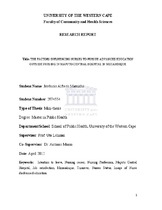| dc.description.abstract | Background: There is evidence that nurses are leaving their profession to seek better working environments and high salaried professions worldwide. This increases the scarcity of skilled nurses in health systems. In Mozambique, nursing staff is increasingly pursuing education out of nursing, which means that they intent to leave the nursing career. Aim: To find out why so many nurses are pursuing education out of nursing: Objectives, to explore: (1) nurses’ experiences of working at the Maputo Central Hospital; (2) the links between nurses’ future education outside of nursing and their job satisfaction; (3) the links between nurses’ future education, their job satisfaction and their intention to leave the profession, and (4) nurses’ and key informants’ opinions on which factors would improve nurse retention at MCH. Study Design: Exploratory qualitative Study. Methods: Focus Group Discussion with nurses and in-depth interviews with key informants, in order to explore perceptions regarding factors influencing nurses’ to pursue education out of nursing. Analysis: The content of focus group discussion and all interviews were recorded, transcribed, coded and analyzed by identifying recurring themes. Ethics: The author was aware that this study would raise sensitive topics in nurses’ lives, and he took great care to be alert and responsive to ethical issues which might arise. Thus, all nurses and key informants participated in the study voluntarily. They were provided with a letter explaining the research purpose, requesting their participation and assuring them of confidentiality and anonymity, and they were asked to sign a consent form which was explained to them in detail. The study was presented to, and approved by the Ethics Committee of the University of the Western Cape. Results: Study results revealed job dis-satisfaction and its essential components as the main factors influencing nurse’s intention to quit their profession. Further, the issue of nursing image and status were found to be most important factors contributing to nurses’ future education in other courses rather than nursing. Conclusions: Findings from this research are relatively consistent with previous studies in terms of identifying common factors that influence nurses’ decisions to quit nursing and pursue other professions, and also worrying as nursing is immersed in deep trouble because many nurses are quitting, and the current prevailing nurse image and status is not attractive for replacements, what will impact negatively on health care delivery. Relevance of study: It is expected that this study will contribute to the implementation of appropriate measures to improve nurses’ working experience at the Maputo Central Hospital, meantime, encouraging their retention. | en_US |

